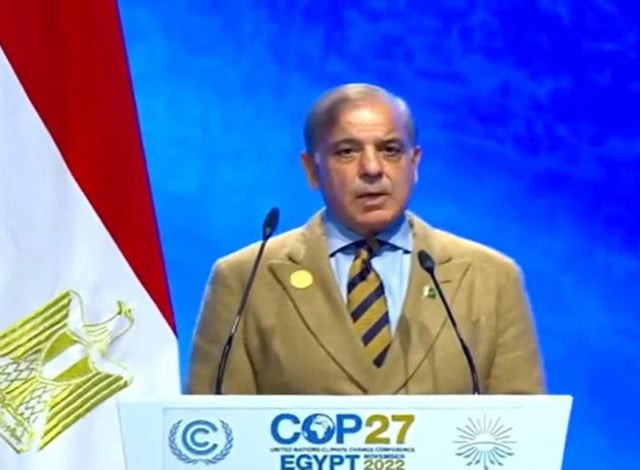Pakistan must take the lead at COP27
The global community should establish a Pakistan-focused climate fund with $50 billion as seed money

The 27th meeting of the Conference of the Parties (COP) of the United Nations Climate Change Conference (UNFCCC), or more commonly referred to as COP27, is being held from November 6th-18th, 2022, in Sharm El Sheikh, Egypt.
Pakistan has a very strong case to present at COP27, as we continue to suffer the aftermath of the catastrophic floods to have stuck the country this summer. The gravity of the devastation was further realised with the UN Secretary General, António Guterres’ visit. His visit came in addition to visits from other high-profile global signatories and officials.
The Pakistani delegation at COP27 is being led by Prime Minister Shehbaz Sharif, and like the 1992 Earth Summit, Pakistan is leading the largest and most influential G-77 bloc in the climate negotiations under the UN framework.
Pakistan has been listed in the top-ten most climate vulnerable countries in the world. The country has been experiencing erratic weather leading to flash floods, severe droughts, glacial lake outbursts, scorching heat waves and increased rainfall variability. Consequently, its ecosystems and landscapes are continually degrading. Forest fires, shifting of plant and animal species, and drying up of water bodies and wells are becoming more frequent due to increased anthropogenic activities.
According to the Sixth Assessment Report of the Intergovernmental Panel on Climate Change (IPCC), the change in climate is likely to increase the frequency and magnitude of such extreme events. Pakistan is party to the UNFCCC, the Paris Agreement, has adopted the Sustainable Development Goals (SDGs) and is seriously pursuing the enforcement of dozens of other Multilateral Environment Agreements (MEAs).
Pakistan, with only 0.43% of global greenhouse gas (GHG) emissions in 2013 and 0.67% in 2020, has an insignificant contribution to the larger phenomenon of global warming. However, the country is already witnessing the severe impact of climate change in the form of unprecedented floods that devoured crops, displaced people and dismantled households across the country between August to September 2022.
According to World Bank figures, the disaster resulted in total financial losses of an estimated $40 billion. The floods also affected 33 million people across Pakistan, left 1,714 people dead, 12,758 people injured, 13,000 km of roads damaged and destroyed 9.8 million acres of arable agricultural land. In addition, the reconstruction and rehabilitation cost may go into billions of dollars as the detailed assessment is underway.
Going forward, Pakistan faces significant challenges in the quest to combat the impact of climate change. Weak and sketchy institutional and climate governance structures, at both the national and sub-national level coupled with poor coordination and limited finances for costly mitigation and adaptation arrangements, are major stumbling blocks in the path towards effective climate governance. Pakistan is not in a position to effectively address the third component of the Paris Agreement, which pertains to climate change adaptation and mitigation.
There are other challenges related to attribution. Addressing loss and damage is less popular because it demands more serious commitment from advanced economies (the main contributor of greenhouse emissions), especially the US and the EU.
For a developing country, accessing the climate and other global funding sources is a complicated process. In addition, the implementing partner (IP), the accredited international agency possessing the professional expertise, takes away most of the resources, leaving governmental institutions without any substantial funding.
For example, the Clean Development Mechanism (CDM) was so complex and bureaucratic that Pakistan could not benefit from it during the past two decades. Similarly, existing funding mechanisms, including methane pledges and the earning of carbon credits for transformation to low carbon renewable energy sources, are all difficult for Pakistan to adequately benefit from.
In COP26, nations adopted the Glasgow Climate Pact, aiming to turn the 2020s into a decade of climate action and support, including financial compensation for loss and damage brought about by climate-induced disasters. The package consists of a range of agreed items, including strengthening efforts to build resilience to climate change, curbing GHG emissions and providing the necessary funding for both.
Nations reaffirmed their duty to fulfil the pledge of providing $100 billion annually to developing countries. In addition, they agreed to work collectively to reduce the gap between the existing emission reduction plans and the emissions cut-off requirement, so that the rise in the global average temperature can be limited to 1.5 degrees.
The methane pledge, led by the United States and joined by over hundred countries at COP26, aimed at supporting developing countries with access to technology and resources. However, this has not seen any progress and effective implementation still remains a major concern despite the passage of one year.
At the summit, Pakistan should propose that compensation for climate-induced loss and damage needs to be a part of the core agenda of COP27. According to initial estimates from the World Bank, Pakistan immediately needs an amount of $53.5 billion.
Likewise, the process of accessing climate finance needs to be made more transparent and simpler for developing countries. Pakistan is yet to see the promised 50:50 balance in adaptation and mitigation finance. Pakistan’s 2030 ambition in the agreed National Determined Contributions (NDCs) are already higher than many countries aiming at a net zero target by 2060.
The global community should establish a Pakistan-focused climate fund with $50 billion as seed money. For the future, capacity building commitments in line with the Bali Action plan are needed for Pakistan to effectively deal with the climate change monster.
The writer is A PhD in Natural Resources Management, has served at provincial, federal and international organisations as an environmental consultant
Published in The Express Tribune, November 14th, 2022.
Like Business on Facebook, follow @TribuneBiz on Twitter to stay informed and join in the conversation.





1733130350-0/Untitled-design-(76)1733130350-0-208x130.webp)











COMMENTS
Comments are moderated and generally will be posted if they are on-topic and not abusive.
For more information, please see our Comments FAQ